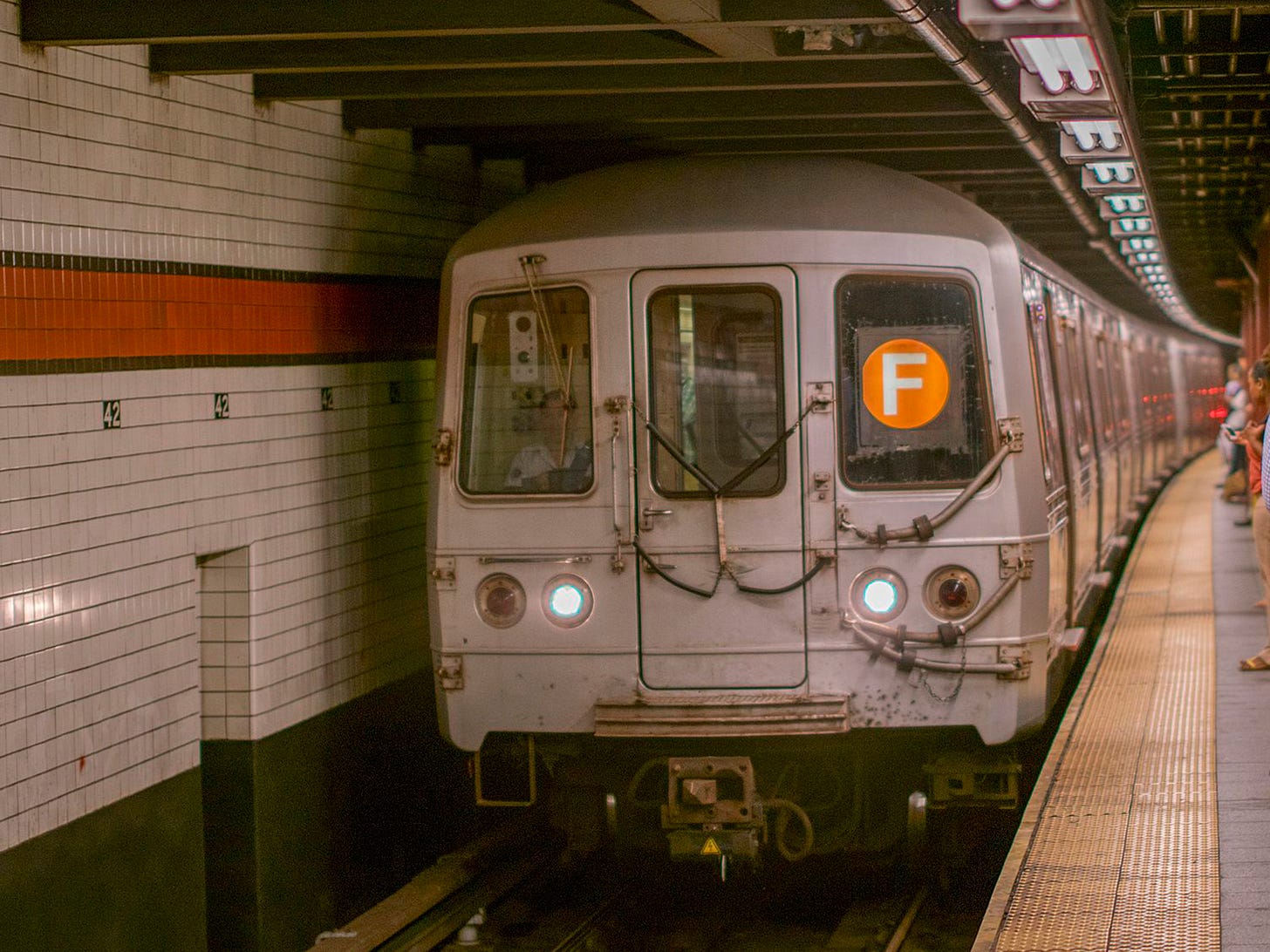Make Way for Barrier and the Dark Enthusiasm
Why don't we move out of people's way proactively?
The F Train
When I lived in Manhattan, I used to commute on the F train from East Broadway to 14th street, and then walk to Union Square. It wasn’t uncommon during rush hour to have to actively force your way into the subway car, only to find that there was more than enough space to accommodate you once you made it clear that you were coming in whether someone moved or not.
There’s a sort of group mentality that forms- a subconscious resistance to newcomers to the car. You might see the commuters closest to the door brace or huddle to make things seem more crowded than they are, or to make forcing one’s way in seem unappealing. They intentionally become Barrier.
Watching this pattern became my commuting past time, since high traffic hours were too cramped to read a book unless you were a lucky soul who snagged a seat, and I had yet to give into audiobooks. The most interesting thing I noticed in my passive study is that by the next station, the former outsiders had been fully incorporated into the car. When the doors opened next, they who just arrived cast bitter hope with the rest of us that none will be foolish enough to enter our car.
There are vertical bars to hold in the center of the train-car, and during these packed periods they often started to look like trees of human limbs. There’s a balancing act between the distance from the pole and the amount of people who can use it, which creates paradoxical space in a crowded car.
My favorite memory from these commutes is also the one time I saw someone occupy this extra space during rush hour. A shorter person came in and stood directly underneath my arm. There was maybe a clearance of about 6 inches between the crown of their head and my elbow. I wasn’t bothered, I’ve been closer to worse. But then… they started doing little hops in place, essentially head-butting my elbow.
They weren’t trying to hurt me, just get me to move my arm from the space directly above them. Thinking back to the episode, I’m not sure which one of us was being an asshole. Probably both. I was refusing to move from public space I had no claim to other than having been their first. They didn’t need the space, they just didn’t like having someone’s arm above them. As a result, they were invading mine. Both of us felt that we were in the right, and they were in the wrong.
Barrier
Here’s something I want you pay attention to next time you’re at a social gathering:
Look for bottlenecks, places in the crowd or layout where there is a hint of enough space to drive a path.
Wait for someone to stand in the bottleneck such that it’s obviously still there, but there’s no getting through it without going through that individual. We’ll call them… Barrier. Make sure Barrier is in the middle of conversation or on their phone- something engaging enough that they aren’t paying much attention to their physical environment, but not so engaging that they are actively tuning out outside distraction. If you see the person initiating conversation with others walking by, that’s ideal.
Perfect, now for the experiment: Put yourself in Barrier’s line of sight / peripheral vision, and try to get through the bottleneck. Don’t say anything, don’t acknowledge Barrier in any way. See how long it takes them to notice you and let you through.
Try it with crowds you are a stranger in, crowds you are foreign in, crowds that know you, and crowds that know you intimately. You’ll find that the likelihood of the person moving out of your way without prompt grows with each further step of familiarity. In my experience, it is extremely rare that Barrier decides to move, even when they clearly see you and what you are trying to do, unless they also know you as an individual or you look intimidating.
I’m perplexed by this behavior. Wouldn’t you want someone else to move for you? Would moving through a crowded room not be a lot easier if people adjusted where they were standing to lighten the load of pathfinding in a crowd for everyone?
I have two friends who will get out of the way without prompt. Not only that, but they often do it proactively. I know who they are because I admire them a lot for this combination of empathy and self awareness, and the fact that they are never having awkward encounters with strangers at parties who are just trying to get around them.
Empathy in that they recognize that the person trying to get through the bottleneck is human like them, and doesn’t need to beg passage like Barrier is a fairy tale troll.
Self awareness in that they know when they are Barrier, and make way.
The most generous reading is that most people don’t stop to think that their existence in a space might inconvenience others. The least generous reading is that people know they’re an inconvenience and don’t care, or even worse- enjoy it.
It’s odd, the practiced way we ignore one another. Both parties can see each other, one is just refusing to acknowledge the other for seemingly no reason. The speed with which Barrier will move if you look threatening is telling. Let’s play with that.
Now start to be forceful as well as polite.
Approach Barrier.
Stop and wait for a second, see if they move.
If they don’t move, Wave your hand.
If they don’t move, say “excuse me.”
If they don’t move, tap them on the shoulder.
If they STILL don’t move, walk your way through the small amount of space as if they weren’t there.
Come back in 5 minutes and do it again.
Does Barrier learn? Do they move for you without asking the second time?
Have a friend try it- do they move for the friend without prompt now that they’ve been primed? Or do they start the song and dance all over again?
The Dark Enthusiasm Goblin
There’s a dark enthusiasm driving spatial greediness that’s akin to worrying a sore tooth. The desire to do something noncooperative or painful or annoying for no reason other than it pleasures some goblinoid part of the soul.
Who is that goblin? What does it want? Why does it incentivize us to annoying someone who’s having a shitty enough day to actually react? Why does it whisper to us to drive at the speed limit in the passing lane? Why does it reward us so paradoxically for poking at a tooth to cause even MORE pain than we are already in?
Let’s go back to Barrier.
Place an attractor in the direction you are trying to move, like a band at a concert or what seems to be a social nexus of the crowd.
Repeat the experiment. Watch the studied ignorance acquire a stolidness, if not a soft-burning hostility. You can see this in any crowd at a concert. The closer you get to the stage, the more agitated people get as you try to continue forward. Depending on the concert there’s a sweet-spot for this rage around the 10th row, which is the border to constantly-jostled land. Are the constant-jostlites less likely to give you trouble since they got to the front the same way you did?
Concerts are great for this experiment because they’re close enough to a line that people feel like they can be cut, without ever having a formal rule.
There’s two potential thoughts I have for what’s going on here:
Mutual policing: Desire for a shared order manifests in outward social pressure to maintain that order. People get mad when you squeeze by them at concerts because they somehow feel you are cutting them in line, which is against the rules.
Boundary maintenance: in the case of people in the subway being fully “part of the car-tribe” by the time they reach the next station, they have permeated the group boundary, and in doing so validated themselves as part of the group.
The goblin is likely working in the space between these two ideas: quickly forming in-groups which which to identify, and thus feel justified and supported when wounded by an outsider.
It doesn’t feel good to be the person blocking another’s path. But it also doesn’t not feel good. The goblin is at work in some part of the lizardbrain that evolved before awareness and wasn’t comfortable with being pushed away from the nipple, or allowing some potentially mate-taking stranger to stride through the herd.
There’s a brutish pragmatism in refusing to make way: why expend energy helping a stranger achieve their goals? It’s anticompetitive. Cooperative even. And the good feelings of cooperation are reserved only for those of your in-group. For good reason, too- there’s little likelihood the stranger will be able to return such a transitory favor.
So instead, we default to selfishness, and the outsiders must force their way in.




